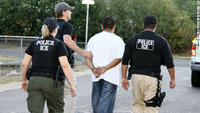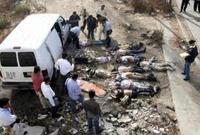-
U.S.-Canada reach border agreement
The U.S.-Canada border security pact reached earlier this year by President Obama and Prime Minister Stephen Harper is nearing completion
-
-
Defying governor, Mass. officials seek to join Secure Communities

Local law enforcement officials and state lawmakers are increasingly working to circumvent Massachusetts governor Deval Patrick’s decision to opt out of the controversial Secure Communities immigration program; last Wednesday U.S Senator Scott Brown (R-Massachusetts) called on DHS secretary Janet Napolitano to allow the state to join Secure Communities without Governor Patrick’s approval; Under Secure Communities, a detained individual’s fingerprints are automatically scanned and checked against DHS and FBI databases to determine their immigration status
-
-
Immigration raid nets nearly 3,000 illegal immigrants

On Wednesday, federal immigration authorities announced they had detained nearly 3,000 illegal aliens in the largest nation-wide raid of its kind; of the 3,000 aliens arrested, more than 1,600 were felons convicted of crimes like manslaughter, attempted murder, armed robbery, sex crimes against minors, and drug trafficking
-
-
Report finds Texas border violence worsening

A recently released report concludes that violence from the Mexican government’s war against the drug cartels is increasingly spreading into the United States; the report found that as the Mexican military cracks down further on drug cartels, these organizations have pushed further north into Texas to create a “sanitary zone”
-
-
Undocumented university student fights to stay in U.S.
As federal immigration officials implement President Obama’s latest immigration guidelines, many undocumented immigrants face an uncertain future with authorities still reviewing existing procedures; an undocumented junior at New York’s Stony Brook University is fighting to stay in the United States following notice by immigration authorities that she and her mother will be sent back to Bangladesh
-
-
InfoZen wins $90 million ICE contract
On Monday InfoZen announced that it had won a $90 million five-year contract with U.S. Immigrations and Customs Enforcement (ICE) to provide IT services
-
-
Sector Report for Thursday, 22 September 2011: Border / Immigration control
This report contains the following stories.
Plus 1 additional story.
-
-
Challenging conventional wisdom on border security
Two new papers say that if the United States is serious about border security, then instead of building bigger walls or throwing more resources at empty enforcement efforts, the United States should adopt strategies that address real threats to U.S. border security — drug cartels
-
-
Lack of comprehensive border security strategy hampers National Guard: GAO
A new GAO report says that that fact that there is no comprehensive security strategy for the U.S.-Mexico border makes it difficult for the Pentagon effectively to use the National Guard units assigned to help the Border Patrol guard the border
-
-
U.S.-Canada border security deal threatens Canadians' privacy: security expert
A new report by a Canadian think tank provides a critique of the recently announced Shared Vision Declaration between Canada and the United States; the report emphasizes what it calls the threat to the privacy of Canadians’ personal information posed by this new initiative
-
-
Fingerprints to be used at U.S.-Mexico border
U.S. Customs and Border Protection (CBP) officers working at the Paso Del Norte (PDN) international crossing in El Paso have initiated work on a system which uses fingerprints to expedite the pedestrian entry process; CBP says the new system will result in more efficient processing of arriving pedestrian traffic
-
-
Environmentalists worry border environment protection
Environmentalists have taken aim at an amendment to the Senate appropriations bill for DHS that would allow border enforcement agencies ultimate authority within 100-miles of the U.S. border
-
-
Pentagon agrees to pay for National Guard deployment along border
After months of debate, the Pentagon has agreed to pay the expenses for keeping 1,200 National Guard troops stationed along the U.S.— Mexico border; the Pentagon will pay roughly $10 million each month for the Guard’s deployment through the end of this year
-
-
Sector Report for Thursday, 8 September 2011: Border / Immigration control
This report contains the following stories.
Plus 1 additional story.
-
-
Mexican border agents cross into U.S. again without permission
A national watchdog group warns that incursions along the southern border by the Mexican government could be a serious potential security threat
-
- All
- Regional
- Water
- Biometrics
- Borders/Immig
- Business
- Cybersecurity
- Detection
- Disasters
- Government
- Infrastructure
- International
- Public health
- Public Safety
- Communication interoperabillity
- Emergency services
- Emergency medical services
- Fire
- First response
- IEDs
- Law Enforcement
- Law Enforcement Technology
- Military technology
- Nonlethal weapons
- Nuclear weapons
- Personal protection equipment
- Police
- Notification /alert systems
- Situational awareness
- Weapons systems
- Sci-Tech
- Sector Reports
- Surveillance
- Transportation
Advertising & Marketing: advertise@newswirepubs.com
Editorial: editor@newswirepubs.com
General: info@newswirepubs.com
2010-2011 © News Wire Publications, LLC News Wire Publications, LLC
220 Old Country Road | Suite 200 | Mineola | New York | 11501
Permissions and Policies
Editorial: editor@newswirepubs.com
General: info@newswirepubs.com
2010-2011 © News Wire Publications, LLC News Wire Publications, LLC
220 Old Country Road | Suite 200 | Mineola | New York | 11501
Permissions and Policies
